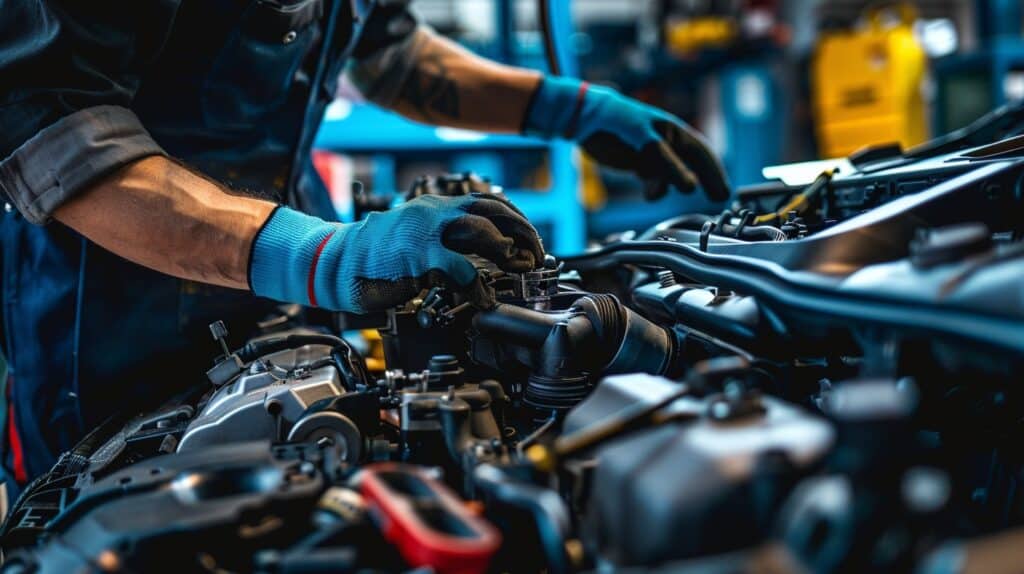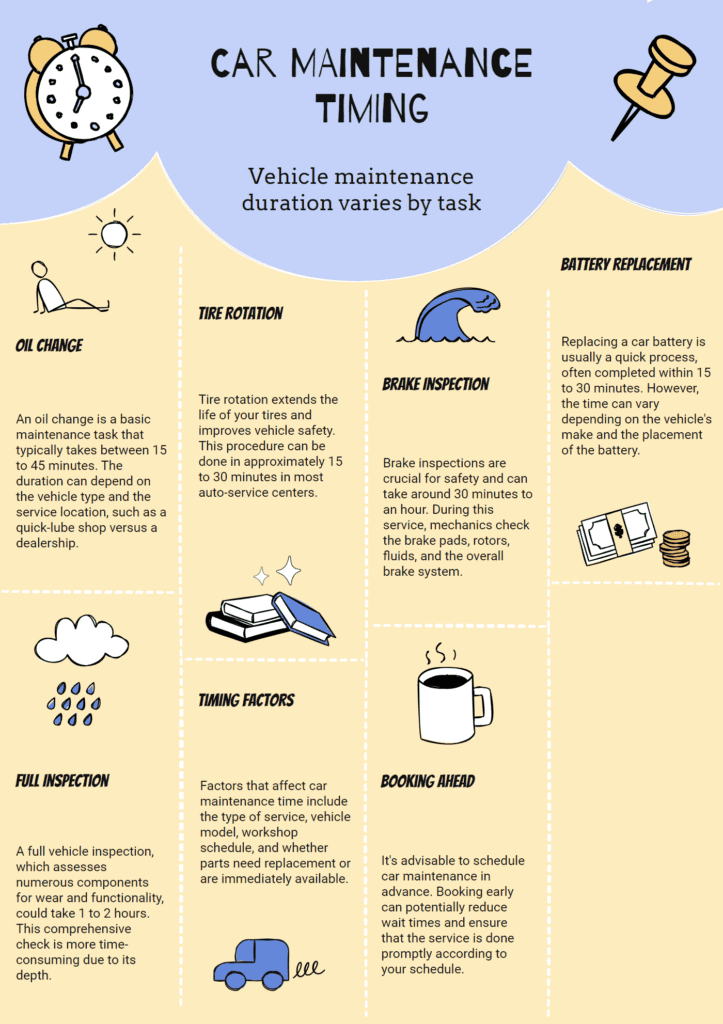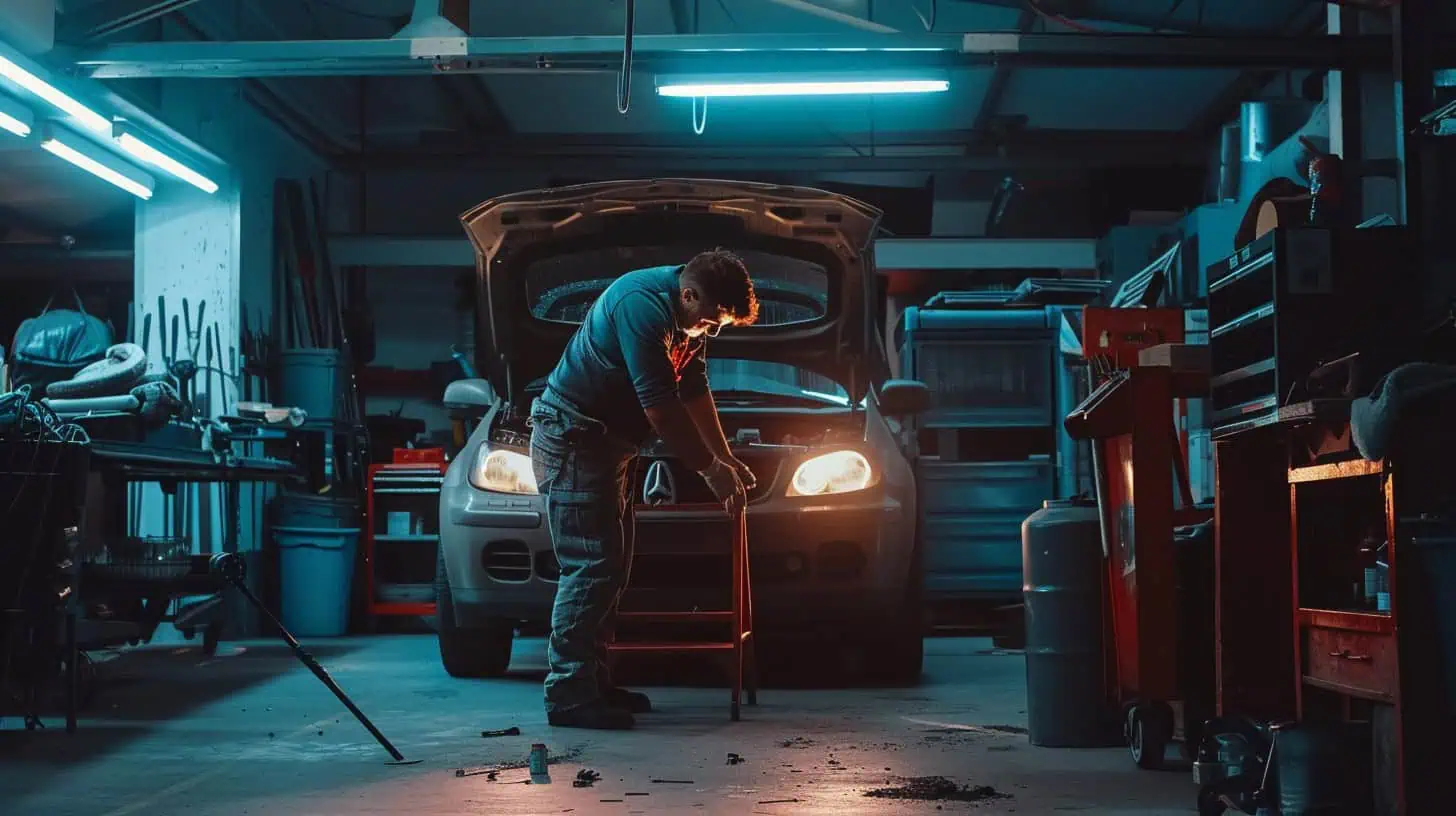Waiting for your car during maintenance feels like watching paint dry. Did you know? A basic oil swap can wrap up in about thirty minutes. This article will guide you through the maze of upkeep timings, offering quick and practical fixes.
Stick around for a smooth ride!
Key Takeaways
Car maintenance includes changing oil, checking brakes, and rotating tires to keep your ride smooth and safe.
Maintenance times vary based on the car’s model, age, and how well it’s been cared for. Quick fixes like oil changes can take about 30 minutes.
Regular car check-ups prevent unexpected breakdowns and costly repairs in the future.
Big repairs like engine or transmission overhauls can take days to weeks. They require careful work, but are essential for your car’s health.
Keeping up with vehicle maintenance enhances safety, performance, saves money on gas, and maintains the car’s value over time.
Table of Contents
Essentials of Car Maintenance

Car upkeep is like feeding your pet; do it right, and they’ll run happily for years. It’s all about checking the brake system, changing engine lubricant, and making sure every part works well.
Defining Car Maintenance
Car maintenance means checking and fixing your vehicle to keep it running smoothly. It’s like giving your car a health check-up. You don’t want it ending up sick on the side of the road, right? From changing its oil to making sure the brakes work well, every bit helps in avoiding big problems later.
Think of it as taking care of a pet; you feed it, bathe it, and take it for check-ups. For cars, this involves regular services like oil swaps, tire rotations, and ensuring all lights are bright and shiny.
These small acts add up to make sure your ride stays reliable for miles to come. Plus, keeping up with these tasks means you’re less likely to face a nasty surprise breakdown or costly repairs down the line.
So grab that service book from the glove compartment and let’s get into what kind of care keeps your metal buddy happy on the road ahead. Next up: diving deep into the key services that form part of routine maintenance.
Key Services in Routine Maintenance
Taking care of your car means keeping up with routine check-ups. These steps make sure it runs smoothly and stays safe on the road. Here’s the lowdown on what you should keep an eye on:
- Oil Changes: Think of engine oil as the lifeblood of your car. It needs a refresh every few thousand miles to keep everything running without a hitch. Not doing this can lead to bigger, costlier fixes down the line.
- Tire Care: This includes checking air pressure, rotating tires according to schedule, and replacing them when the tread gets too low. Your tires are what keep you glued to the road, so making sure they’re in tip-top shape is key for safe driving.
- Brakes Check: Listen for any strange noises or feelings when you use the brake pedal. Replacing brake pads or rotors before they wear down too much can save you from hair-raising moments on the road.
- Battery Inspection: Your car’s battery has a tough job, especially in extreme weather. Test it regularly to avoid getting stranded with a car that won’t start.
- Fluid Levels: This covers everything from brake fluid to power steering fluid and coolant. Keeping these topped up prevents overheating and ensures smooth sailing while driving.
- Lights and Signals: Making sure all your lights work is more than just avoiding a ticket; it’s about being seen by other drivers at night or in bad weather.
- Air Filter Swap: A clean air filter helps your engine perform better and improves gas mileage. It’s like giving your car a breath of fresh air.
- Belt Inspections: Belts drive many essential parts of your engine. Checking them for wear and tear can prevent sudden breakdowns.
With these maintenance tasks in check, you’re not just saving potential repair costs, but also boosting your car’s performance and safety on the road! Next up, let’s dive into how long you can expect each maintenance task to take.
Time Investment in Car Maintenance

Keeping your car, truck, or minivan running smoothly isn’t a one-time deal; it’s an ongoing journey. Time spent on upkeep differs like night and day depending on what you’re fixing or checking.
Fleet maintenance software can help manage the schedule for all your family’s wheels, big or small. This tech tool keeps track of oil changes to brake checks, making sure nothing slips through the cracks.
Variables Impacting Service Time
Car maintenance doesn’t always take the same amount of time. Many factors can speed it up or slow it down.
- Your car’s model and make matter a lot. Some vehicles are just designed to be easier to work on. Mechanics can get to the parts faster, which speeds things up.
- The age of your car plays a big role too. Older cars might need more TLC or have parts that are harder to find.
- How well you’ve taken care of your car impacts service time as well. Regular check – ups mean fewer surprises and quicker fixes.
- The type of service needed changes things. An oil swap is quicker than fixing brake lines or replacing an engine.
- Your mechanic’s schedule can affect timing. A busy shop means you might have to wait longer, even for simple tasks.
- Weather conditions also come into play, especially for outdoor workstations or if specific issues are weather-sensitive.
- Availability of parts is crucial. If your auto shop has to order something, you’ll be waiting longer.
- Lastly, unexpected hiccups like seized lug nuts or additional repairs found during a vehicle inspection can add time.
Now, let’s move on and look at how long some common maintenance tasks actually take!
Detailed Time Estimates for Common Maintenance Tasks

Ever wonder how long you’ll be hanging out in the waiting room at your local auto shop? Well, keep reading to get the scoop on how quick those common car fixes really are!
Duration of Tire Services
Tire services don’t take all day. In fact, rotating your tires might just clock in at an hour max. The trick lies in knowing the right spot for each tire, which hinges on their tread pattern and your car’s drivetrain.
Think of it as a puzzle, where every piece has its place for the whole picture to come together properly.
The early bird gets the worm, but the second mouse gets the cheese.
Swapping out worn tires for new ones is another chapter of this story. This task can stretch a bit longer, depending on how busy the auto shop is and if they’ve got your type of tire on hand.
It’s like waiting for your turn at a crowded ice cream stand – patience pays off with sweet results!
Time for Oil Changes
After figuring out how long it takes to fix your tires, let’s talk about oil changes. Getting an oil change is like giving your car a quick spa treatment. An auto mechanic can do this in about 30 minutes.
Yes, you heard that right—only half an hour and your car’s engine will be running smoother than before.
Think of the engine as the heart of your car. Just like you wouldn’t want anything clogging up your arteries, you don’t want old oil sludging up your engine. Fresh oil keeps everything moving without any hiccups or glitches.
So, driving into an automotive repair shop for a regular oil switcheroo isn’t just good; it’s great for keeping things humming along under the hood.
Brake Replacement Timeframe
Switching gears from oil changes to brake replacement, the timeframe can really vary. Getting new brakes might take as little as 15 minutes, or it could eat up a whole day’s work. Sometimes, things like stuck wheels or lug nuts can add extra time to the job.
Mechanics at repair shops use tools like wrenches and lifts to swap out old brakes for new ones faster. Yet, even with top skills and equipment, some brake jobs just take longer due to issues that pop up.
Every car is different, so there’s no one-size-fits-all answer on how long it will definitely take.
Lengthier Repairs and Their Timeframes

Fixing big car problems takes more time. Changing an engine or fixing a transmission can feel like waiting for paint to dry – long and a bit boring.
Engine Replacement Duration
Swapping out a car’s heart, the engine, is a big job. It might take anywhere from 7 to 21 days. Think of it as surgery for cars. First, you need the right engine to put in your vehicle.
This can be like finding a needle in a haystack! Once you’ve got it, mechanics have to carefully remove the old engine and install the new one without messing up anything else under the hood.
Replacing an engine isn’t just about swapping parts; it’s reviving your car’s soul.
During this time, they’ll also reconnect all those vital parts that make your car go – think fuel pipes, water pumps, and electrical connectors. And let’s not forget about testing everything afterwards to make sure your ride runs smoothly.
So while waiting might test your patience, remember: good things come to those who wait… especially when it comes to giving your car a new lease on life!
Extent of Major Engine Repairs
Major engine repairs can feel like opening a can of worms. Your car’s heart might need a fix or, worse, a complete swap. These jobs are big and complicated. They involve many parts like the pistons, fuel systems, and often the timing mechanism.
Each piece needs careful attention.
Fixing an engine is not quick. It could take days or even weeks if problems run deep. An auto shop works hard to identify every issue, from leaks to wear on moving components. Remember, keeping your vehicle healthy with regular checks helps avoid these long stays at the repair shop.
Transmission Overhaul Timing
Fixing your car’s transmission is a big deal. It can take from a few hours to several days. The time needed depends on the specific problem. Keeping up with transmission service stops bigger issues and makes your car last longer.
If you skip this care, repairs might hit your wallet hard later.
Sure, regular checks at an auto shop keep things smooth and prevent hydrolocking or other damage that could cost a fortune. Next up, let’s talk about how keeping your vehicle in top shape pays off big time.
Advantages of Timely Vehicle Maintenance

Keeping your car in top shape pays off big time. Think of it like hitting two birds with one stone: your ride stays safe on the road, and you avoid burning a hole in your wallet from unexpected repairs.
Safety Enhancements
Regular upkeep makes your ride safer. It’s like giving your car a health check. This way, you catch the small issues before they turn into big problems that could put you at risk on the road.
Think about it – catching a worn-out brake pad early means you avoid brake failure when zipping down the highway. And let’s not forget, a car in top shape is less likely to leave you stranded.
Staying on top of maintenance also means smoother handling and more reliable braking system performance, making every journey safer. Plus, with everything from the ignition system to air filters in check, your vehicle responds better in tricky situations.
No skidding or hydroplaning surprises! It’s all about preventing those heart-stopping moments that can happen if parts fail mid-drive. Being proactive beats being stuck any day.
Performance Gains
Keeping your car in top shape not only makes it safer but also boosts how well it runs. Think of your vehicle like a sprinter. Just as runners need good food, rest, and training to perform their best, cars require regular check-ups and tune-ups for peak performance.
Services such as changing oil and replacing spark plugs can make a huge difference in how smoothly your car operates.
These tweaks lead to better fuel efficiency, meaning the car uses less gasoline on trips. It’s like giving your vehicle a pair of high-tech running shoes so it can go further while using less energy.
Also, when engines run efficiently thanks to preventive upkeep, they pump out more power. This means quicker acceleration when you hit the gas pedal and smoother rides all around town or on long drives.
Keeping up with maintenance turns your ride into a lean, mean traveling machine that saves you money at the pump and feels great to drive.
Economic Benefits
Taking care of your car saves you money. Think about it: spending a little now on regular upkeep means avoiding big repair bills later. Regular checks and fixes keep your vehicle running smoothly, making it use less fuel.
Over time, this drops how much you spend at the gas station.
Cars that get looked after don’t lose their value as fast either. When you decide to sell or trade in your wheels, a good maintenance record can mean more cash in your pocket. And remember, a well-cared-for car rarely breaks down unexpectedly, saving you from pricey tow trucks and rental cars.
A stitch in time saves nine.
Efficiency in Time Management
Managing your time well with car maintenance can save you a bundle and keep stress at bay. Think about it, regular checks and tune-ups mean fewer breakdowns. This translates to not wasting time stranded on the side of the road or dealing with unexpected repair shops visits.
Plus, sticking to a routine maintenance schedule keeps your vehicle running smoothly. You won’t have to guess when your car’s next check-up is due.

By taking care of oil changes, tire rotations, and brake inspections on time, you dodge major repairs that eat up hours or even days. Imagine swapping out an engine or overhauling the transmission system; these are big jobs that hog lots of clock ticks.
But with timely preventative care, you significantly reduce the chances of these lengthy fixes cropping up. It’s smart – like choosing roads less traveled to avoid traffic jams during rush hour commutes!
FAQs About How Long Car Maintenance Takes
How quick can I get my car back from maintenance?
“Quick as a hiccup!” Most basic auto repairs and preventive maintenance, like oil changes or tire rotations, take just a few hours. But if your ride’s got more under the hood issues or needs a roadworthiness test, it might camp out at the auto shop overnight.
Is there a way to speed up car maintenance?
Sure thing! Being proactive is key. Keep an eye on your vehicle history report and don’t ignore those little warning signs – like a grumpy engine or squeaky brakes. Regular check-ups at your local auto body shop can prevent big problems that take longer to fix.
Can luxury garages handle my donk car faster?
Luxury garages have the tools and know-how for high-end cars for men and their unique needs, but remember, quality takes time. Whether it’s fixing up damaged cars or installing winter tires before the snow hits, they aim for perfection over speed.
What takes longer: fixing a puncture or replacing brake rotors?
Replacing brake rotors wins this race…or should we say loses? Fixing a puncture might set you back an hour tops, while swapping out those brake rotors could eat up half your day at least.
Does getting an extended warranty mean quicker service for automotive repairs?
Not exactly “quicker,” but smoother sailing? Definitely! An extended warranty often means you skip the headache of cost negotiations at dealerships or auto repair shops – they’ve got you covered!
If my car fails its MOT test because of worn tires, how long will replacements take?
No sweat! Replacing all-season tires can be done in less than an afternoon’s work at most auto shops—fast enough that you won’t miss your favorite evening drive route.




